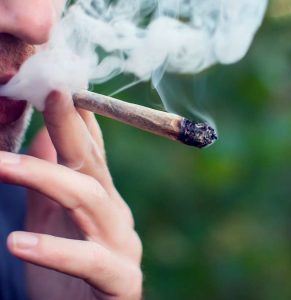New evidence is emerging that people who use medical marijuana to manage pain and other conditions may experience significant withdrawal symptoms when they discontinue use. A recent study conducted by Lara Coughlin, Assistant Professor of Psychiatry, University of Michigan, concluded that “59% percent of people using medical cannabis for chronic pain experienced moderate to severe withdrawal symptoms if they stopped ingesting weed for hours or days” according to the publication The Conversation.
Specifically, Coughlin and her colleagues found that 41% of medical cannabis users experienced mild withdrawal symptoms, while 34% and 25% experienced moderate to severe withdrawal symptoms, respectively. The researchers also concluded, “Withdrawal symptoms tend to be stable over a 2-year period, but younger age is predictive of worse symptoms and of an escalating withdrawal trajectory.” Similarly, a 2002 meta-analysis found that “cannabis use had a medium-sized association with consequences.”

While symptoms can vary from person to person, a study titled The cannabis withdrawal syndrome: current insights from The National Center for Biotechnology Information (NCBI) reports the following symptoms commonly associated with Cannabis Withdrawal Syndrome (CWS) :
- irritability
- nervousness/anxiety
- sleep difficulty
- decreased appetite or weight loss
- depressed mood
- one of the following physical symptoms such as abdominal pain, shakiness/tremors, sweating, fever, chills, or headache.
Notably, there were a number of covariants in the NCBI study, such as consumption of alcohol and tobacco products, that increased the likelihood of more severe CWS symptoms. Additionally, much like Coughlin and her colleagues, the researchers concluded that CWS “precipitates a specific withdrawal syndrome with mainly mood and behavioral symptoms of light to moderate intensity, which can usually be treated in an outpatient setting.”
However, there is concern about the prevalence of CWS, specifically, and marijuana use disorder, generally. Medical News Today reports “Over 300,000 people begin treatment for marijuana use disorders in the U.S. each year,” and that “30.6 percent of those who use marijuana had marijuana use disorder in 2012–2013.”
The physiology of CWS is relatively straightforward. As Coughlin explains, “Among those who don’t use weed for a period of several hours or days, cannabinoid levels drop and they experience withdrawal symptoms.” Although there is a lack of conclusive research, most evidence suggests it usually doesn’t take long for levels that are normally present in our bodies without the external use of cannabis to reset.
Roger Roffman, a University of Washington researcher who studied cannabis use for more than 25 years, states “After a couple of days of cessation, cannabis withdrawal syndrome starts. It will likely be largely over within two weeks to a month,” adding “Ultimately, it’s not a psychological process. It’s a physiological change in the brain as the body becomes adapted to marijuana no longer being there.”
In reality, none of this information should come as a surprise. Almost any type of addiction is going to be associated with some type of withdrawal symptoms. As Harvard Medical School (HMS) points out:
“It makes absolute sense that there would be a withdrawal syndrome because, as is the case with many other medicines, if you use cannabis every day, the natural receptors by which cannabis works on the body ‘down-regulate,’ or thin out, in response to chronic external stimulation. When the external chemical is withdrawn after prolonged use, the body is left in the lurch, and forced to rely on natural stores of these chemicals — but it takes time for the natural receptors to grow back to their baseline levels. In the meantime, the brain and the body are hungry for these chemicals, and the result is withdrawal symptoms.”
Moreover, there are some fair questions to ask regarding any firm conclusions about CWS or marijuana disuse disorder. Firstly, what is meant by addiction? The medicalizing of this term in broad strokes is problematic. Again, HMS writes:
“. . . if one substituted ‘coffee’ for ‘cannabis,’ many of the 160 million Americans who guzzle coffee on a daily basis would have ‘caffeine use disorder,’ as evidenced by the heartburn and insomnia that I see every day as a primary care doctor. Many of the patients that psychiatrists label as having cannabis use disorder believe that they are fruitfully using cannabis to treat their medical conditions — without problems — and recoil at being labeled as having a disorder in the first place. This is perhaps a good indication that the definition doesn’t fit the disease.”
Secondly, what should people who use marijuana to relieve pain, anxiety, depression, or nausea do as an alternative should they be compelled to discontinue marijuana use for fear of addiction? Should they resort to taking opiates, a substance with a much stronger addiction and withdrawal profile? Perhaps they should get a prescription for an anti-depressant so they can endure impotency and insomnia? Would anxiolytics, which often lead to increased dependency and escalating dosages, be a better option? Or, perhaps they should just “grind it out” and accept that they will be continually in pain or nauseous.
The bottom line is that most people who use marijuana to relieve pain or other medical issues find it the best option for their symptoms. And while there is room for abuse, we shouldn’t conflate that issue with any type of call to alter the course we are on in liberalizing, what for many people, is nothing short of a “miracle plant.”
At Newsweed.com, we adhere to three simple principles: truth, balance, and relatability. Our articles, podcasts, and videos strive to present content in an accurate, fair, yet compelling and timely manner. We avoid pushing personal or ideological agendas because our only agenda is creating quality content for our audience, whom we are here to serve. That is why our motto is ”Rolling with the times, straining for the truth.”
Your opinion matters. Please share your thoughts in our survey so that Newsweed can better serve you.






